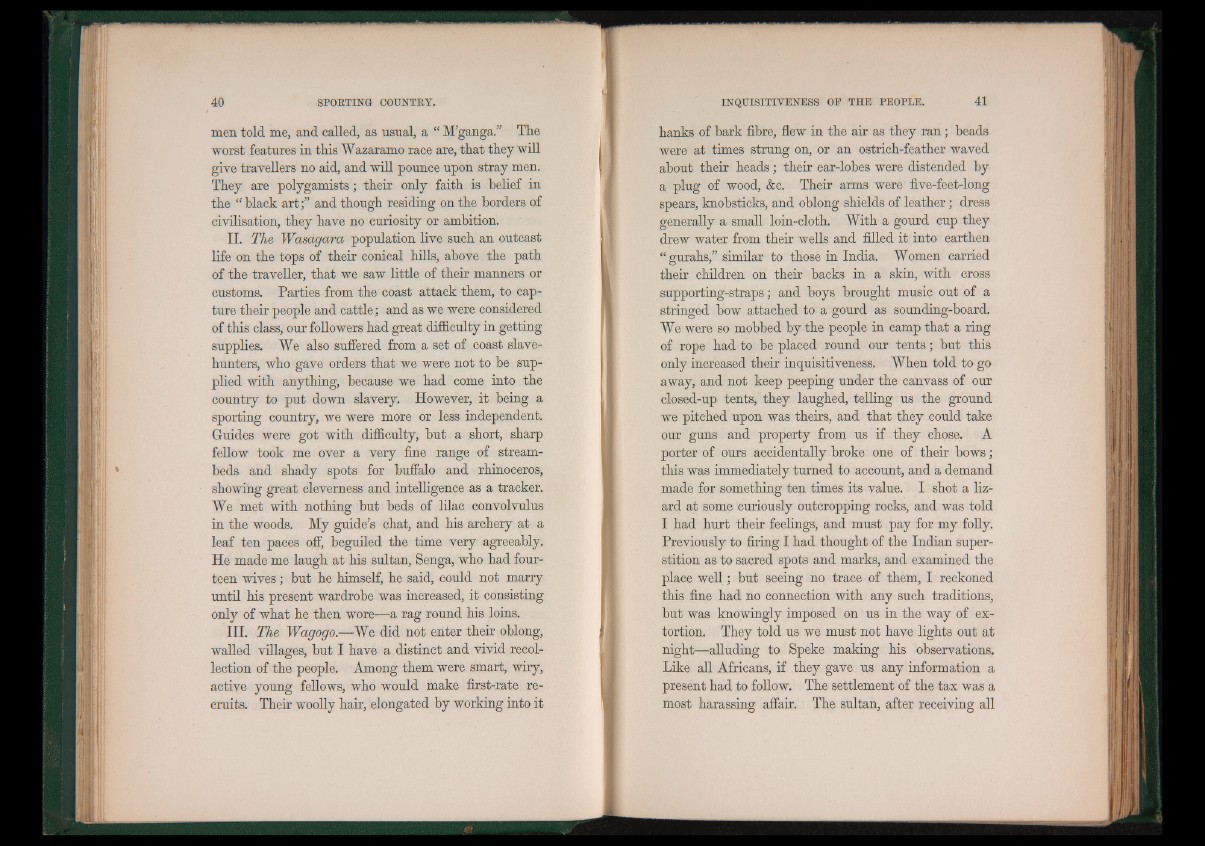
men told me, and called, as usual, a “ M’ganga.” The
worst features in this Wazaramo race are, that they will
give travellers no aid, and will pounce upon stray men.
They are polygamists; their only faith is belief in
the “ black art;” and though residing on the borders of
civilisation, they have no curiosity or ambition.
II. The Wasagara population live such an outcast
life on the tops of their conical hills, above the path
of the traveller, that we saw little of their manners or
customs. Parties from the coast attack them, to capture
their people and cattle; and as we were considered
of this class, our followers had great difficulty in getting
supplies. We also suffered from a set of coast slave-
hunters, who gave orders that we were not to be supplied
with anything, because we had come into the
country to put down slavery. However, it being a
sporting country, we were more or less independent.
Guides were got with difficulty, but a short, sharp
fellow took me over a very fine range of stream-
beds and shady spots for buffalo and rhinoceros,
showing great cleverness and intelligence as a tracker.
We met with nothing but beds of lilac convolvulus
in the woods. My guide’s chat, and his archery at a
leaf ten paces off, beguiled the time very agreeably.
He made me laugh at his sultan, Senga, who had fourteen
wives; but he himself, he said, could not marry
until his present wardrobe was increased, it consisting
only of what he then wore—a rag round his loins.
III. The Wagogo.—We did not enter their oblong,
walled villages, but I have a distinct and vivid recollection
of the people. Among them were smart, wiry,
active young fellows, who would make first-rate recruits.
Their woolly hair, elongated by working into it
Tianka of bark fibre, flew in the air as they ran ; beads
were at times strung on, or an ostrich-feather waved
about their heads; their ear-lobes were distended by
a plug of wood, &c. Their arms were five-feet-long
spears, knobsticks, and oblong shields of leather; dress
generally a small loin-cloth. With a gourd cup they
drew water from their wells and filled it into earthen
“ gurahs,” similar to those in India. Women carried
their children on their backs in a skin, with cross
supporting-straps; and boys brought music out of a
stringed bow attached to a gourd as sounding-board.
We were so mobbed by the people in camp that a ring
of rope had to be placed round our tents; but this
only increased their inquisitiveness. When told to go
away, and not keep peeping under the canvass of our
closed-up tents, they laughed, telling us the ground
we pitched upon was theirs, and that they could take
our guns and property from us if they chose. A
porter of ours accidentally broke one of their bows;
this was immediately turned to account, and a demand
made for something ten times its value. I shot a lizard
at some curiously outcropping rocks, and was told
I had hurt their feelings, and must pay for my folly.
Previously to firing I had thought of the Indian superstition
as to sacred spots and marks, and examined the
place well; but seeing no trace of them, I reckoned
this fine had no connection with any such traditions,
but was knowingly imposed on us in the way of extortion.
They told us we must not have lights out at
night—alluding to Speke making his observations.
Like all Africans, if they gave us any information a
present had to follow. The settlement of the tax was a
most harassing affair. The sultan, after receiving all